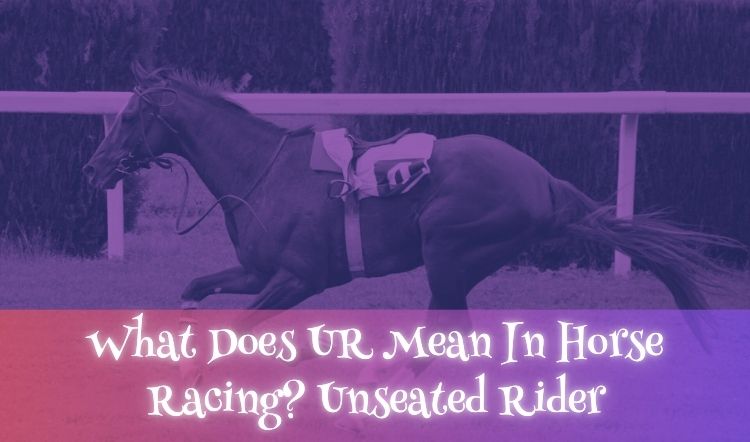
If you’ve ever placed a bet on a horse race, you may have come across the abbreviation “UR” without knowing exactly what it signifies. It’s one of many shorthand terms used in the sport that can be puzzling at first glance. So, what exactly does this mean?
In this blog post, we’ll explore what this abbreviation means and why it’s important for both spectators and punters to understand. Read on to find out more about this aspect of horse racing.
UR Horse Racing Meaning
In horse racing, the abbreviation “UR” refers to an instance where a jockey is unseated during a race, resulting in the horse continuing without a rider. This can happen at any stage of the race—whether at the starting line, mid-course, or even near the finish.
According to the rules of racing, a horse must be ridden to the finish line to be officially placed. Therefore, if a horse completes the course without a jockey, it will not be included in the final race standings.
The term 'Unseated Rider' highlights the horse’s inability to finish the race under the direction of its jockey. This is typically noted as “UR” in race results or when reviewing a horse’s performance history.
Do You Get Money Back For Unseated Rider?
When it comes to betting on horse racing, an unseated rider can be a frustrating outcome—especially if you've backed that horse. It’s a common assumption that a bettor might get their money back in such cases, but in most standard markets, that’s not how it works. If a horse unseats its jockey during the race, bets placed on that horse in win, place, or each-way markets are usually considered losing bets.
However, some bookmakers do offer promotions like 'Faller Insurance' or 'Unseated Rider Insurance'. These typically refund a bettor’s stake if their horse falls, is brought down, or loses its rider mid-race.
As always, the details may vary depending on the bookmaker, so it’s worth checking their specific terms and conditions before placing your bet. Always keep responsible gambling practices in mind when betting on horse racing, and never wager more than you are willing to lose.
What Happens If a Horse Wins Without a Jockey?
Although it’s an unusual sight, there have been occasions where a horse has lost its rider early on yet continued to run—and even crossed the finish line first. However, under the rules of racing, a horse cannot officially win a race without a jockey on board.
For a result to stand, the horse must carry its assigned weight—including the jockey—from start to finish. If a horse completes the race without its rider, it is automatically disqualified. So, even if it crosses the line ahead of the rest, it won’t be recognised as the winner, either in terms of prize money or for betting purposes.
How Often Do Jockeys Fall?
The likelihood of a jockey falling or being unseated can vary depending on several factors, including the type of race, track conditions, and the experience of both horse and rider. Falls are more common in National Hunt (jump) racing, where horses are required to clear fences or hurdles—adding an extra layer of complexity to the race.
While every effort is made to prioritise safety, the unpredictable nature of horse racing means that a potential fall can never be completely ruled out. That said, jockeys are highly trained athletes who undergo extensive preparation to reduce this risk and to respond swiftly and safely if things do go wrong.
In summary, while seeing “UR” next to your chosen horse is never ideal, it’s a reminder of the unpredictability that makes horse racing such a dynamic and engaging sport. Whether you’re a casual viewer or a seasoned punter, understanding the terminology and the realities of the sport can deepen your appreciation of each race.
**The information provided in this blog is intended for educational purposes and should not be construed as betting advice or a guarantee of success. Always gamble responsibly.
